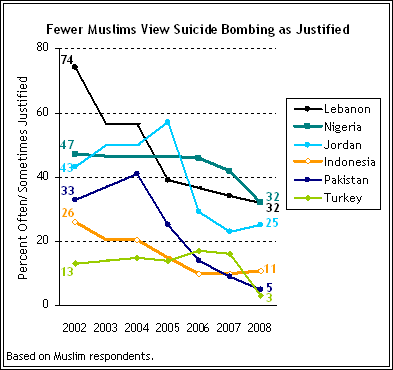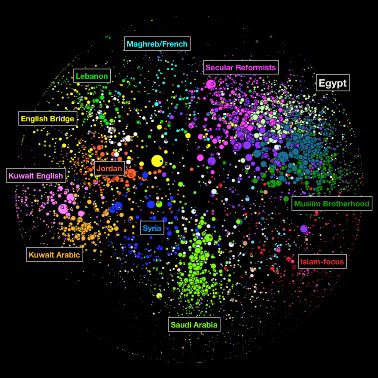I think Thomas Friedman vastly overstates the role of the Internet in violent extremism in his New York Times column today. He wastes no time in blaming the Internet for terror:
Let’s not fool ourselves. Whatever threat the real Afghanistan poses to U.S. national security, the “Virtual Afghanistan” now poses just as big a threat. The Virtual Afghanistan is the network of hundreds of jihadist Web sites that inspire, train, educate and recruit young Muslims to engage in jihad against America and the West. Whatever surge we do in the real Afghanistan has no chance of being a self-sustaining success, unless there is a parallel surge — by Arab and Muslim political and religious leaders — against those who promote violent jihadism on the ground in Muslim lands and online in the Virtual Afghanistan.
The inspiration for his indictment of the Web is the widely reported story that the five Muslim Americans from Northern Virginia who were picked up in Pakistan last week had used the Internet to connect with an extremist in Pakistan. He quotes the Washington Post with the emerging beltway consensus:
‘Online recruiting has exponentially increased, with Facebook, YouTube and the increasing sophistication of people online,’ a high-ranking Department of Homeland Security official said. … ‘Increasingly, recruiters are taking less prominent roles in mosques and community centers because places like that are under scrutiny. So what these guys are doing is turning to the Internet,’ said Evan Kohlmann, a senior analyst with the U.S.-based NEFA Foundation, a private group that monitors extremist Web sites.
First, the ‘Sargodha Five’ are kind of an odd group to cite as evidence since they were by all accounts a complete failure. They were not able to gain access to or acceptance into any local Al-Qaeda groups and were picked up by the Pakistani authorities relatively quickly. That said, don’t get me wrong, these extremist sites exist and extremists use the Internet just like a lot of other groups. But those sites are small in number and states, combined with civil society, have been pretty effective at getting many of them shut down or forced into the more hidden areas of the Web. The Internet is also a place where, increasingly, the type of reasoned, informed and interactive religious debate that Friedman argues for are actually taking place.
The broader point to be made here is that blaming the Internet for extremism is like blaming boats, cars or shoes, just because terrorists used them in the last attack. I think Tim Stevens at the ICSR blog captures my thoughts pretty well when he writes:
You’d have to be a fool to argue that the internet plays no role in many of the cases that come to light in the press and in the courts. It almost always does. So do cars, telephones and cheap hotels. The internet is so deeply embedded in the lives of most people residing in the West that it would be unusual were this not so. It is too easy to argue that government consistently fails to spot extremist use of the internet, and that more powers are needed to combat it. If, as liberal societies, we determine that total surveillance of interpersonal communication is undesirable, we should also understand that it is utterly impractical. It also won’t stop people turning to violence as a solution to their particular problems.
He goes on to argue, appropriately, that clamping down on the Internet will not solve the problem.
The answer is not to monitor us all to combat the actions of a few. Total security, in cyberspace or otherwise, is impossible, and attempts to create it are subject strongly to the law of diminishing returns. The only way to combat violent extremism is to tackle its causes, a banal statement in itself perhaps. Like it or not, states will decide what types of material are deemed inappropriate to view and share online, but treating all internet use as de facto potentially problematic and appropriate for regulation does no-one any favours.
I also think Friedman overstates the level of support for extremism among Muslims, and offering as proof the relative levels of Muslim outrage over the Swiss vote to ban minarets compared to the insufficient, in his view, condemnation of a recent bombing in Iraq is bizarre. The US press (including, ah hem, the New York Times) spilled a lot more ink on the Swiss vote than anything that happened in Iraq last week. Does that mean all Americans – Christian, Muslim or agnostic – now support extremism? Obviously, no.

In fact, a number of surveys in the Muslim world and other evidence have shown decreasing support for violent extremism, including this Pew poll. Pew notes that support for suicide bombings has dropped since 2002, and that in Pakistan support plunged from 33% to 5%. And as Gary Bunt, a scholar who has studied Muslims’ use of the Internet extensively, writes in his excellent book iMuslims:
Participation in militaristic jihad is a minority issue, on- and offline. Muslim individuals and organizations have expended considerable energies – on the Internet and elsewhere – distancing themselves from such acts.
Just as it is wrong to conflate everything good with the Internet, it’s also wrong to associate it with everything pernicious. As we wrote in our paper on the Arabic blogosphere, “The Internet lays a good foundation for a battle of ideas, but it does not necessarily favor a winner.”






 Click Here
Click Here